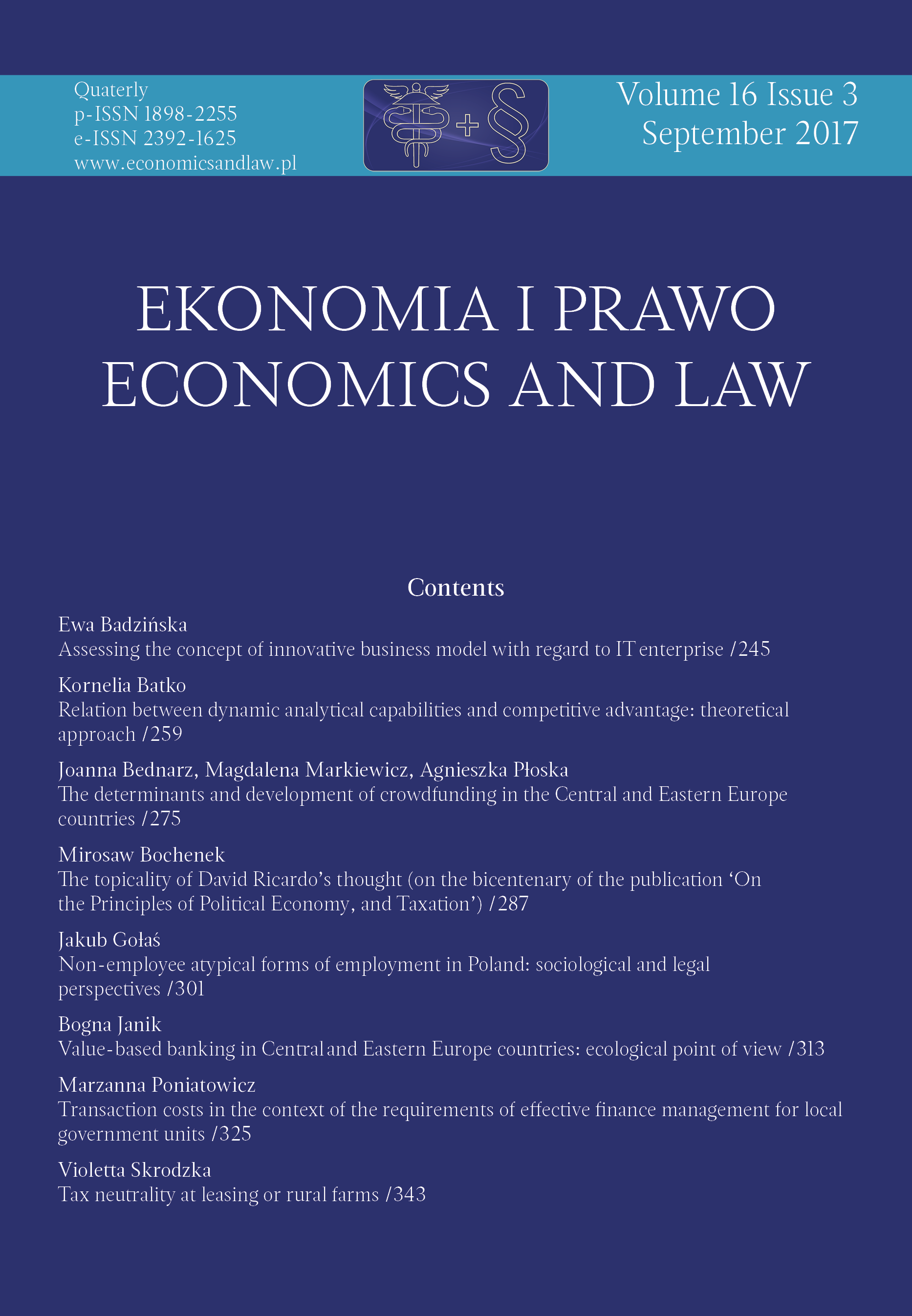Relation between dynamic analytical capabilities and competitive advantage: theoretical approach
DOI:
https://doi.org/10.12775/EiP.2017.018Keywords
dynamic analytical capabilities, analytics, competitive advantage, analytical organization, analytical maturityAbstract
Motivation: The contributory factor to undertake the subject was a research gap regarding the role of dynamic analytical capabilities in building competitive advantage of the organization. The analyzed issue is gaining in importance in an era of increasing requirements for the reinforcement of competitive position of organization, creation of unique resource bundles, ability to access extremely rapidly growing amounts of data, development of business intelligence, big data analysis and even competition analyses. Many scientific papers and case studies have shown that Dynamic analytical capabilities (DAC) of the organization can provide benefits to organizations and create competitive advantage.
Aim: The purpose of this paper is to identify dynamic analytical capabilities of the organization as an emerging research area on building a competitive advantage. Also the objective of this paper is to present theoretical model which describes the relationship between the three elements: dynamic analytical capabilities of the organization, analytical maturity and competitive advantage. In order to achieve the defined purpose, the critical literature analysis on dynamic analytical capabilities of the organization, analytical maturity and competitive advantage will be performed. Due to this fact, this paper presents a theoretical study.
Results: The article presents the concepts of dynamic analytic capabilities, considering factors that affect it. As a result of literature research, I constructed a theoretical model showing the relationship between the dynamic analytical capabilities and its determinants, analytical maturity and competitive advantage. The results of studies led me to make the statement that the analytical maturity of the organization is a mediator of relationship between dynamic analytical capabilities and competitive advantage of organization.
References
ATKearney. (2015). Gain advantage through analytics. Retrieved 20.02.2017 from https://www.atkearney.com.
Barney, J. (1991). Firm resources and sustained competitive advantage. Journal of Management, 17(1). doi:10.1177/014920639101700108.
Batko, K. & Billewicz, G. (2015). Dynamiczne zdolności analityczne organizacji czynni-kiem kreowania przedsiębiorczości. Przegląd Organizacji, 8.
Beske, P. (2012). Dynamic capabilities and sustainable supply chain management. International Journal of Physical Distribution & Logistics Management, 42(4), doi:10.1108/09600031211231344.
Bhatt, G.D & Grover, V. (2005). Types of information technology capabilities and their role in competitive advantage: an empirical study. Journal of Management Infor-mation Systems, 22(2). doi:10.1080/07421222.2005.11045844.
Bhatt, G.D. (2001). Knowledge management in organizations: examining the interac-tion between technologies, techniques, and people. Journal of Knowledge Manage-ment, 5(1). doi:10.1108/13673270110384419.
Booth, S.A. (2015). Crisis management strategy: competition and change in modern organizations. doi:10.4324/9781315645674.
Cosic, R., Shanks, G., & Maynard, S.B. (2015). A business analytics capability frame-work. Australasian Journal of Information Systems, 19. doi:10.3127/ajis.v19i0.1150.
Davenport, T., & Harris, J. (2013). Competing on analytics: the new science of winning. Boston: Harvard Business Press.
Denrell, J., & Powell, T. (2016). Dynamic capability as a theory of competitive ad-vantage: contributions and scope conditions. In D.J. Teece & S. Leih (Eds.), The Ox-ford Handbook of Dynamic Capabilities. doi:10.1093/oxfordhb/9780199678914.013.007.
Eden, C., & Ackermann, F. (2013). Making strategy: the journey of strategic manage-ment. London: Sage.
Erickson, G.S., & Rothberg, H.N. (2013). A strategic approach to knowledge develop-ment and protection. The Service Industries Journal, 33(13–14). doi:10.1080/02642069.2013.815740.
Fawcett, S.E., Wallin, C., Allred, C., Fawcett, A.M., & Magnan, G.M. (2011). Information technology as an enabler of supply chain collaboration: a dynamic capabilities per-spective. Journal of Supply Chain Management, 47(1). doi:10.1111/j.1745-493X.2010.03213.x.
Grant, R.M. (1991). The resource-based theory of competitive advantage: implications for strategy formulation. California Management Review, 33(3). doi:10.2307/41166664.
Hamel, G., & Prahalad, C.K. (1990). Corporate imagination and expeditionary market-ing. Harvard Business Review, 69(4).
Isik, O., Jones, M.C., & Sidorova, A. (2013). Business intelligence success: the roles of BI capabilities and decision environments. Information & Management, 50(1). doi:10.1016/j.im.2012.12.001.
Kozlenkova, I.V., Samaha, S.A., & Palmatier, R.W. (2014). Resource-based theory in marketing. Journal of the Academy of Marketing Science, 42(1). doi:10.1007/s11747-013-0336-7.
Kraaijenbrink, J., Spender, J.C., & Groen, A.J. (2010). The resource-based view: a re-view and assessment of its critiques. Journal of Management, 36(1). doi:10.1177/0149206309350775.
Lawson, B., & Samson, D. (2001). Developing innovation capability in organisations: a dynamic capabilities approach. International Journal of Innovation Management, 05(03). doi:10.1142/s1363919601000427.
Mason, N. (2014). Ingredients for an Analytical Organization. Retrieved 02.12.2014 from http://www.clickz.com.
Mesquita, L.F., Anand, J., & Brush, T.H. (2008). Comparing the resource‐based and relational views: knowledge transfer and spillover in vertical alliances. Strategic Management Journal, 29(9). doi:10.1002/smj.699.
Mitrega, M., & Pfajfar, G. (2015). Business relationship process management as com-pany dynamic capability improving relationship portfolio. Industrial Marketing Management, 46. doi:10.1016/j.indmarman.2015.02.029.
Morgan, N.A., Vorhies, D.W., & Mason, C.H. (2009). Market orientation, marketing capabilities, and firm performance. Strategic Management Journal, 30(8). doi:10.1002/smj.764.
Olszak, C. M. (2016). Toward better understanding and use of Business Intelligence in organizations. Information Systems Management, 33(2). doi:10.1080/10580530.2016.1155946.
Olszak, C.M. (2014), Towards an understanding Business Intelligence. A dynamic capability-based framework for Business Intelligence. In M. Ganzha, L. Maciaszek, & M. Paprzycki (Eds.), Proceedings of the 2014 Federated Conference on Computer Science and Information Systems. doi:10.15439/2014F68.
Popovic, A., Hackney, R., Coelhoc, P.S., & Jaklica, J. (2012), Towards business intelli-gence systems success: effects of maturity and culture on analytical decision mak-ing. Decision Support Systems, 54(1). doi:10.1016/j.dss.2012.08.017.
Porter, M.E. (2011). Competitive advantage of nations: creating and sustaining superi-or performance. Free Press: New York.
Renz, D.O., & Herman R.D. (Ed.). (2016). The Jossey-Bass handbook of nonprofit lead-ership and management. Hoboken: John Wiley & Sons. doi:10.1002/9781119176558.
Rothaermel, F.T. (2015). Strategic management. New York: McGraw-Hill.
Teece, D.J. (2007). Explicating dynamic capabilities: the nature and microfoundations of (sustainable) organization performance. Strategic Management Journal, 28(13). doi:10.1002/smj.640.
Teece, D.J., Pisano, G., & Shuen, A. (1997). Dynamic capabilities and strategic man-agement. Strategic Management Journal, 18(7). doi:10.1002/(SICI)1097-0266(199708)18:7%3C509::AID-SMJ882%3E3.0.CO;2-Z.
Webster, F. (2014). Theories of the information society. London: Routledge. doi:10.4324/9780203426265.
Downloads
Published
How to Cite
Issue
Section
Stats
Number of views and downloads: 1003
Number of citations: 0
